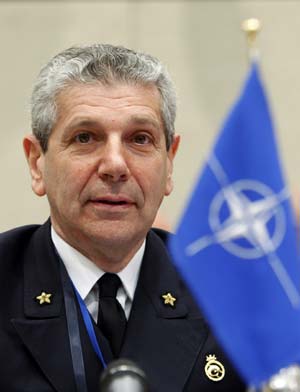Those plans were hit by the expulsion last week of two Russian diplomats accused of spying at NATO headquarters and the tit-for-tat ejection of two Canadians working at the NATO information office in Moscow.
The angry words from both sides over the espionage episode, combined with Russian bluster about the NATO war games in Georgia, cast a shadow over hopes of an Obama-inspired warming of relations.
Russian President Dmitry Medvedev blasted the Georgia maneuvers as a "genuine provocation" and warned of "negative consequences" for those behind them. Lavrov pulled out of his first meeting with NATO counterparts since the August conflict, denouncing the alliance's "confrontational logic of the Cold War".
NATO diplomats acknowledge that Georgia will be a long-term bugbear in relations with Russia but they also suggest there is a growing willingness within the alliance to seek a new understanding with Moscow despite its continued hostility toward the government in Tbilisi.
Obama's decision to take a fresh look at the Bush administration's plans to install anti-missile defenses in Poland and the Czech Republic could remove one major Russian concern.
Washington's offer of talks on a new strategic arms reduction treaty has been welcomed by the Kremlin, which appreciates such reminders of its nuclear superpower status.
The United States also is wooing Russia for support in its efforts to curb the nuclear ambitions of Iran and the Democratic People's Republic of Korea, and wants Moscow to support the fight against the Taliban by opening new supply routes to troops in Afghanistan.
Such global issues, Lavrov suggested to US Secretary of State Hillary Clinton this week, were worth more to the West than any concern over little Georgia.
"The task of further reductions of strategic offensive weapons is too important for both Russia and for (the) US and, for the entire world in fact, to make it hostage of any particular regime," he said at a news conference, in an apparent reference to the Saakashvili regime.
Characteristically Moscow's envoy to NATO put it more bluntly.
"Is it a good idea to tease the Russian bear by continuing to support regimes in Georgia and Ukraine only so they stand ready to be used as a counterweight to Russia?" Ambassador Dmitry Rogozin wrote Wednesday in the New York Times.
If it continues to do so, Rogozin warned, "NATO will be the first to suffer, in terms of both the security and economic stability of its member states."
Faced with such threats, Washington and its NATO allies have to decide whether efforts to appease Russian concerns will simply embolden hardliners in Moscow to seek additional concessions, or whether a more conciliatory approach will persuade the Kremlin that NATO can be a partner rather than a rival, even if it eventually revives plans to take on more members in the East.
 |
|
Chairman of the NATO Military Committee Admiral Giampaolo Di Paola delivers a speech at the start of a NATO Chiefs of Defence meeting at the Alliance headquarters in Brussels May 6, 2009.[Xinhua]
|
(Xinhua News Agency May 11, 2009)